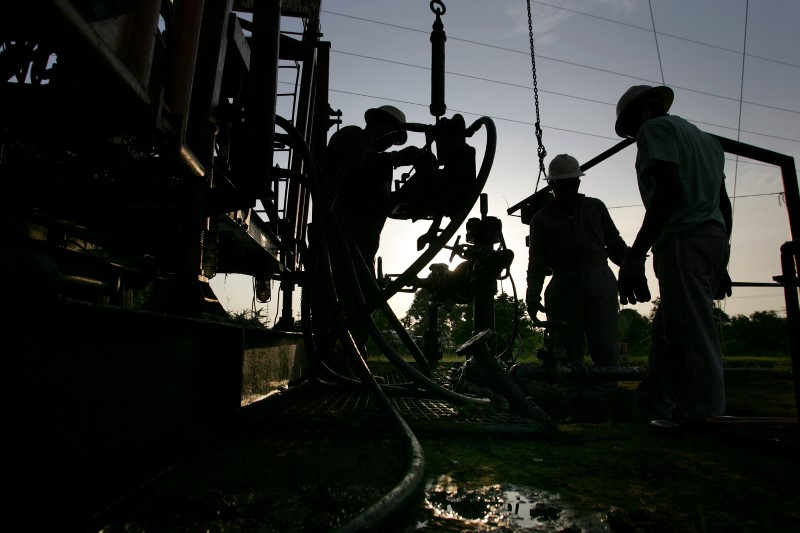* OPEC+ weighs oil cuts extension, sees weaker compliance
* Moderna says vaccine 94.5% effective in preventing
COVID-19
* China crude throughput hits record high in October
By Jessica Jaganathan
SINGAPORE, Nov 17 (Reuters) - Oil prices edged higher on
Tuesday on expectations OPEC and its allies will extend oil
production cuts for at least three months, while sentiment was
bolstered by news of another promising coronavirus vaccine.
Brent crude futures for January LCOc1 rose 16 cents, or
0.4%, to $43.98 a barrel by 0104 GMT and U.S. West Texas
Intermediate crude for December CLc1 added 13 cents, or 0.3%,
to $41.47 a barrel.
Equity markets rose on hopes of a quicker economic recovery
after Moderna Inc MRNA.O said its experimental COVID-19
vaccine was 94.5% effective in preventing infection based on
interim late-state data. This comes after Pfizer Inc PFE.N reported last week that
its vaccine was more than 90% effective.
"If we judge economic recovery, particularly through the
lens of oil markets... with multiple high efficacy vaccines in
the pipeline, there is good chance mobility will return close to
pre-pandemic levels later in 2021," said Stephen Innes, chief
global markets strategist at axi in a note.
OPEC+, which groups the Organization of the Petroleum
Exporting Countries (OPEC) and its allies, including Russia, is
set to hold a ministerial committee meeting on Tuesday that
could recommend changes to production quotas when all the
ministers meet on Nov. 30 and Dec. 1.
The group is leaning towards postponement of a planned
January increase in oil output for at least three months to
support prices as the COVID-19 pandemic continues its second
wave, sources told Reuters on Monday. China's crude oil throughput in October rose to its
highest-ever level, underpinning a fast demand recovery in the
world's second largest oil consumer.
"Oil demand in China is exceeding pre-COVID-19 levels which
suggests oil demand is not permanently impaired," analysts from
Bernstein Energy said.
"This is in line with mobility data and supports the view
that oil demand has not been structurally damaged by changes in
behaviour post COVID-19 for countries which emerged successfully
from COVID-19."
- English (USA)
- English (UK)
- English (India)
- English (Canada)
- English (Australia)
- English (South Africa)
- English (Nigeria)
- Deutsch
- Español (España)
- Español (México)
- Français
- Italiano
- Nederlands
- Português (Portugal)
- Polski
- Português (Brasil)
- Русский
- Türkçe
- العربية
- Ελληνικά
- Svenska
- Suomi
- עברית
- 日本語
- 한국어
- 简体中文
- 繁體中文
- Bahasa Indonesia
- Bahasa Melayu
- ไทย
- Tiếng Việt
- हिंदी
Oil prices edge higher ahead of OPEC+ meeting, vaccine hopes
Published 11/17/2020, 09:21 AM
Updated 11/17/2020, 09:30 AM
Oil prices edge higher ahead of OPEC+ meeting, vaccine hopes

Latest comments
Install Our App
Risk Disclosure: Trading in financial instruments and/or cryptocurrencies involves high risks including the risk of losing some, or all, of your investment amount, and may not be suitable for all investors. Prices of cryptocurrencies are extremely volatile and may be affected by external factors such as financial, regulatory or political events. Trading on margin increases the financial risks.
Before deciding to trade in financial instrument or cryptocurrencies you should be fully informed of the risks and costs associated with trading the financial markets, carefully consider your investment objectives, level of experience, and risk appetite, and seek professional advice where needed.
Fusion Media would like to remind you that the data contained in this website is not necessarily real-time nor accurate. The data and prices on the website are not necessarily provided by any market or exchange, but may be provided by market makers, and so prices may not be accurate and may differ from the actual price at any given market, meaning prices are indicative and not appropriate for trading purposes. Fusion Media and any provider of the data contained in this website will not accept liability for any loss or damage as a result of your trading, or your reliance on the information contained within this website.
It is prohibited to use, store, reproduce, display, modify, transmit or distribute the data contained in this website without the explicit prior written permission of Fusion Media and/or the data provider. All intellectual property rights are reserved by the providers and/or the exchange providing the data contained in this website.
Fusion Media may be compensated by the advertisers that appear on the website, based on your interaction with the advertisements or advertisers.
Before deciding to trade in financial instrument or cryptocurrencies you should be fully informed of the risks and costs associated with trading the financial markets, carefully consider your investment objectives, level of experience, and risk appetite, and seek professional advice where needed.
Fusion Media would like to remind you that the data contained in this website is not necessarily real-time nor accurate. The data and prices on the website are not necessarily provided by any market or exchange, but may be provided by market makers, and so prices may not be accurate and may differ from the actual price at any given market, meaning prices are indicative and not appropriate for trading purposes. Fusion Media and any provider of the data contained in this website will not accept liability for any loss or damage as a result of your trading, or your reliance on the information contained within this website.
It is prohibited to use, store, reproduce, display, modify, transmit or distribute the data contained in this website without the explicit prior written permission of Fusion Media and/or the data provider. All intellectual property rights are reserved by the providers and/or the exchange providing the data contained in this website.
Fusion Media may be compensated by the advertisers that appear on the website, based on your interaction with the advertisements or advertisers.
© 2007-2025 - Fusion Media Limited. All Rights Reserved.